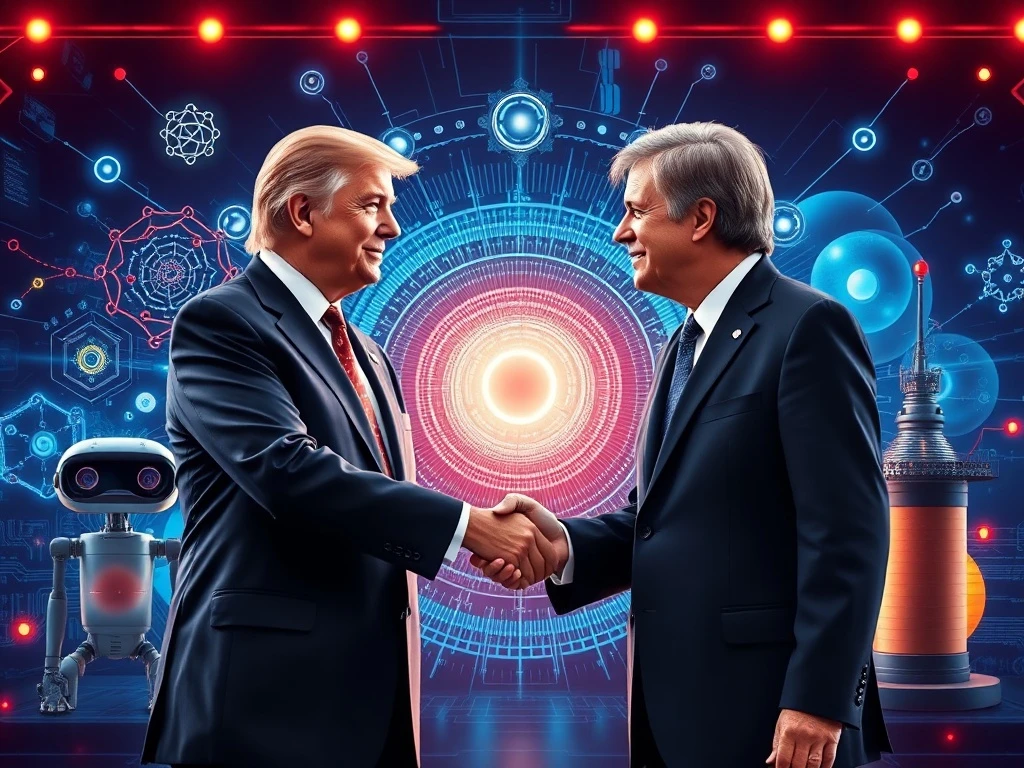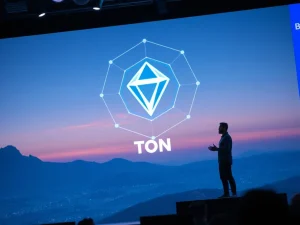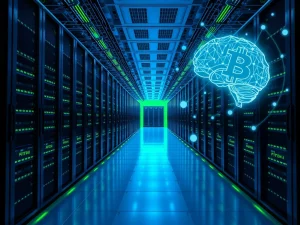US UK Collaboration: Unleashing a New Era of AI and Quantum Innovation

The landscape of global technological advancement is shifting rapidly. For those in the cryptocurrency space, understanding these changes is vital. A recent agreement between the United States and the United Kingdom marks a significant step. This **US UK collaboration** aims to jointly develop critical **emerging technologies**. These include artificial intelligence, quantum computing, nuclear energy, and telecommunications. This initiative holds profound implications, particularly for the future of digital assets and their underlying security.
Forging a Path in Advanced AI Development
US President Donald Trump and UK Prime Minister Keir Starmer signed a memorandum of understanding (MOU) on Thursday. This occurred during Trump’s state visit to the United Kingdom. The agreement outlines a joint effort to advance several key technological areas. It specifically targets **AI development**, nuclear energy, telecommunications, and quantum computing. These technologies have broad applications, ranging from space travel to military defense. They also extend to targeted biomedical drugs and medical procedures.
The MOU, while not legally binding, proposes joint research initiatives. Various government departments and agencies in both countries will participate. They will study these cutting-edge technologies. This strategic partnership aims to accelerate innovation. It also seeks to secure leadership in the global tech race. Both nations recognize the transformative power of artificial intelligence. They are committed to ensuring a secure and reliable supply of the best AI hardware and software globally.
Quantum Computing: A Double-Edged Sword for Crypto Security
One of the most intriguing aspects of this **US UK collaboration** involves **quantum computing**. The two countries will form a task group. This group will develop quantum computing hardware, software, algorithms, and interoperability standards. Quantum computing has gained significant attention within the crypto community. This is because sufficiently powerful quantum computers could potentially crack modern encryption standards. These standards are central to crypto’s very existence. Therefore, advancements in this field directly impact **crypto security**.
The development of quantum technology presents both opportunities and challenges. On one hand, it could lead to revolutionary breakthroughs in data processing and security. On the other, it poses a long-term threat to current cryptographic methods. This includes those protecting Bitcoin and other cryptocurrencies. Researchers are actively working on post-quantum cryptography. This aims to safeguard digital assets against future quantum attacks. The joint task group’s work will be critical in shaping this future landscape.

US President Donald Trump, left, and UK Prime Minister Keir Starmer, right, hold press briefing following the signing of the MOU. Source: The White House
Revolutionizing Energy with Nuclear Energy Development
The MOU also highlights a significant focus on **nuclear energy** development. Both countries will collaborate on developing and deploying “advanced” nuclear energy plants. This includes nuclear fusion reactors. The goal is clear: end reliance on foreign fuels and strengthen the energy supply chain. The White House announcement declared, “The world is at the dawn of a golden nuclear age.” This signifies a strong commitment to sustainable and powerful energy sources.
Nuclear fusion is the opposite process of nuclear fission. Fission involves splitting atoms, a technology pioneered in the 1940s. Fusion, however, pushes atoms together to generate energy. It is considered much safer than fission. Fusion reactors emit significantly less radiation. They also do not pose the same risk of catastrophic meltdown as traditional fission reactors. These advanced reactors can deliver a greater amount of energy. This is essential for energy-hungry applications like artificial intelligence and high-performance computing.
The Energy Abundance Paradox for Proof-of-Work Cryptos
Abundant and cheap energy, while beneficial for many sectors, could disrupt proof-of-work (PoW) mining algorithms. These algorithms secure certain cryptocurrencies. If energy becomes extremely cheap to produce, the economic barrier imposed by proof-of-work may deteriorate. This could potentially allow malicious actors to attack PoW protocols. Such attacks might involve spam transactions or even 51% attacks. Therefore, the future of **nuclear energy** could dramatically reshape the economics of crypto mining and its **crypto security** implications.
Furthermore, the UK and US will explore building 6G mobile telecommunications networks. This is part of the broader technological research and development effort. This initiative underscores a comprehensive approach to securing future digital infrastructure.
Economic Impact and Future Steps for Emerging Technologies
US President Donald Trump emphasized the collaboration’s positive economic effect. He highlighted increased investments across industrial sectors. During Thursday’s press briefing, Trump stated, “This trip has galvanized $350 billion in deals across many sectors.” He further affirmed commitment to ensuring the UK remains a secure and reliable supplier of top-tier AI hardware and software. Trump also noted a $17 trillion investment in the US over the last year. The country aims to dominate the global race in artificial intelligence, digital technologies, and high-performance computing systems.
The next steps in this collaborative effort involve establishing an “Executive Branch-level Working Group.” This group will be formed within the next six months. It will then begin research and development collaboration through annual meetings. However, the White House clarified that the MOU does not create any legally binding obligations. Neither country is obligated to spend money on the initiatives or alter existing agreements. This framework allows for flexibility while fostering cooperation on critical **emerging technologies**.
This **US UK collaboration** signals a strong alliance focused on innovation. It impacts various industries, including the evolving world of cryptocurrency. The advancements in **AI development**, **quantum computing**, and **nuclear energy** will undoubtedly shape our technological future and redefine the landscape of **crypto security**.

A simplified illustration of the nuclear fusion process. Source: International Atomic Energy Agency (IAEA)








